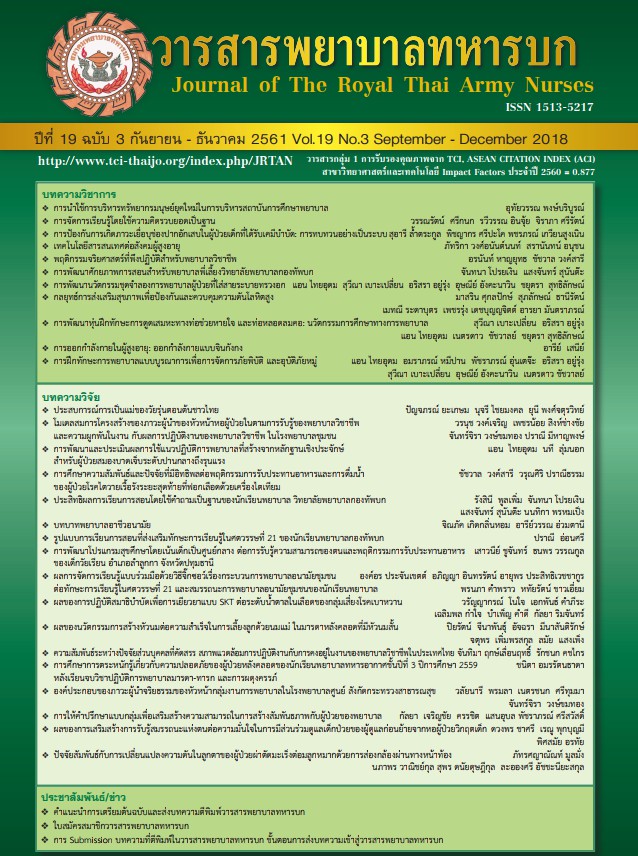Development of Health Education On Child Centered Program In Self-Efficacy and Food Consumption Behavior among School-Aged Children in Lamlukka District, Pathumthani Province
Keywords:
Health education on child centered program, self-efficacy, food consumption behavior, school-aged childrenAbstract
This quasi-experimental study aimed to investigate the effects of health education on child centered program in self-efficacy and food consumption behavior among school-aged children in Lamlukka district, Pathumthani province. Apply from self-efficacy theory by Bandura. The sample included 37 students, age-range 10-12 years old. The samples were received program 3 times, in 2 weeks. Experimental data was collected at 2 week after the intervention by using self-efficacy and food consumption questionnaire. Data were analyze by using dependent t-test. The results revealed that the effects of health education on child centered program in self-efficacy and food consumption behavior among school-aged children after ending the program. The mean score of self-efficacy was statistically significantly higher than a mean score of before participating the program (p<.05). The mean score of food consumption behavior after attending the program was higher than before attending the program with no statistical significance (p>.05). Our suggestion is that, school health nurses or teachers could apply the health education on child centered program in self-efficacy and food consumption behavior among school-aged children for the prevention malnutrition or obesity in children.
Downloads
References
2. Aekplakorn W, editor. The 5th Survey of Health Examination in Thailand, 2014. n.p. 2014. (in Thai)
3. Mo-suwan L. Thailand-Child nutrition. Songkhla: Chanmuang Press; 2010. (in Thai)
4. Piaget J, Inhelder B. The Growth of logic; From childhood to adolescence. New York: Basic Book; 1964.
5. No-in K. Overweight and Obesity among Thai School-aged Children and Adolescents. Journal of The Royal Thai Army Nurses, 2017; 18 (Supplement May–August): 1-8. (in Thai)
6. Ninkron P. Effects of the Program for Behavioral modification Food Consumtion by the Self-Efficacy Theory and Social Support Among Students of Primary School Level 5 - 6 in Banmor district, Saraburi Province. (Master Thesis). Chonburi: Burapha University; 2011 (in Thai)
7. Choojan S. The effects of a self-efficacy and family support promotion program on the consumption behavior among overweight school-age children. (Master Thesis). Pathumthani: Thammasat University; 2015. (in Thai)
8. Bandura A. Self - efficacy: The exercise of control. New York: W.H. Freeman and company; 1997.
9. Cohen J. Statistical power analysis for the behavioral sciences. New York: Lawrence Enlbaum associates publishers; 1988.
10. Faul F, Erdfelder E, Buchner A, Lang AG. Statistical power analyses using G*Power 3.1: tests for correlation and regression analyses. Behavior Research Methods. 2012; 41(4): 1149-1160.
11. Ruttanatam P. Effects of Applying the Thai Traditional Medicine and Self Efficacy theory for Modification to control Overweight in Mahasarakham Rajabhat University Students. (Master Thesis). Mahasarakham: Mahasarakham University; 2014. (in Thai)
12. Sanprik S. The Effect of Health Education Program Applying Self-efficacy Theory Towards Weight Control Among Grade 6 Students at Kajonkietsuksa School, Phuket Province. Journal of Community Health Development Quarterly Khon Kaen University, 2017; 5(2) 297-314. (in Thai)
13. Suan-an A, Rattanagreethakul S, Krungkraipetch N. The Effect of Perceived Self-efficacy promoting program on weight control behaviors among
overweight children in municipality Meaung Lopburi, Lopburi Province. Journal of Public Health Nursing, 2016; 30(3): 26-40. (in Thai)
14. Lally P, Jaarsveld C, Potts H, Wardle J. How are habits formed: Modelling habit formation in the real world. European Journal of Social Psychology, 2010; 40(6): 998-1009.
15. Sota J. Concepts theories and application for health behavioral development. Khon Kaen: Khon Kaen University Printing House; 2011. (in Thai)
Downloads
Published
How to Cite
Issue
Section
License
บทความหรือข้อคิดเห็นใดใดที่ปรากฏในวารสารพยาบาลทหารบกเป็นวรรณกรรมของผู้เขียน ซึ่งบรรณาธิการหรือสมาคมพยาบาลทหารบก ไม่จำเป็นต้องเห็นด้วย
บทความที่ได้รับการตีพิมพ์เป็นลิขสิทธิ์ของวารสารพยาบาลทหารบก
The ideas and opinions expressed in the Journal of The Royal Thai Army Nurses are those of the authors and not necessarily those
of the editor or Royal Thai Army Nurses Association.






